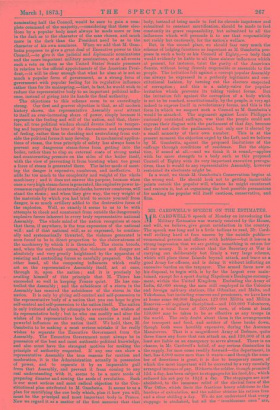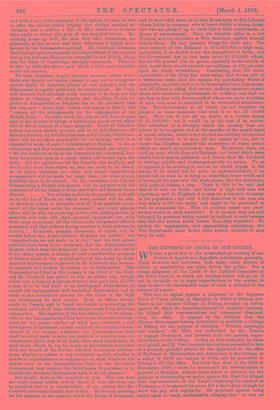MR. CARDWELL'S SPEECH ON THE ESTIMATES.
AIR. CARDWELL'S speech of Monday on introducing the 111 Military Estimates was warmly received by the House, and will, we believe, give great satisfaction in the country.. The speech was long and is a little tedious to read, Mr. Card- well striking hard at foes unseen by the outside public economical persons and officere with hobbies—but it leaves a strong impression that we are getting something in return for all our money. It is evident that the Secretary at War is carrying out deliberately but firmly a very large scheme,. which will place these Islands beyond attack, and leave us a- good Army for offence, and is doing it without inflicting an excessive burden on the taxpayer. The armed force now at his disposal, to begin with, is by far the largest ever main- tained, except for a spurt during Napoleon's Boulogne encamp- ment, within the United Kingdom. Excluding the Army of India, 62,000 strong, the men still employed in the Colonies and foreign military stations, like Gibraltar, and Malta, and Yokohama, but including reserves and pensioners, we have here at home some 80,000 Regulars, 129.000 Militia and Militia Reserves—all regularly disciplined—and 160,000 Volunteers, making a total force of 369,000 men, of whom at least 150,000 may be taken to be as effective as any troops in the world. The only doubt about them is the arrangements for transport and food, and neither of these broke down, though both were horribly expensive, during the Autumn Manceuvres. That is a magnificent Army of Defence, quite three times any force that can attack us, and 120,000 of it at least are liable on an emergency to serve abroad. There is no chance, in Mr. Cardwell's belief, of any serious diminution in the supply, for men come readily forward—the department, in fact, has 4,000 more men than it wants—and though the num- ber of desertions is great, it is due to temporary causes, of which the most important will be corrected by a very carefully arranged increase of pay. Hitherto the soldier, though promised 15d. a day, has been subject to stoppages for his food,&c., which reduced his net pay to 10Id, a day. The stoppages are now abolished, to the immense relief of the clerical force of the War Office, which finds the fractions heavy additions to the burdens of calculation, and the soldier obtains his rations free and a clear shilling a day. We do not understand that every stoppage is abolished, but all the "troublesome ones" are,
and with a very little extension of the system we may be able to offer the soldier board, lodging, fire, clothes, medical at- tendance, and a shilling a day, an offer which even in these days ought to attract the pick of our unskilled labour. Re- cruiting keeps up well, the men who offer themselves are physically as fine as ever, and their behaviour is highly satis- factory to the Commander-in-Chief. Mr. Cardwell intimates that the high opinion expressed by foreign officers of the regulars during the Autumn Manceuvres extended to the Militia, whom also the Duke of Cambridge specially commends. There is, in fact, no difficulty about men which a little more liberality would not remove.
We have therefore, despite alarmist rumours about deser- tions, and despite our undue, though it may not be altogether unwise lenity tb deserters, plenty of raw material, and the Department is rapidly perfecting its organisation. Mr. Card-
well declares that although much remains to be done, yet his system of "linking" the Regular and Auxiliary Forces to- gether in Administrative Brigades has so far advanced that the very next "Army List," which will appear in March, will "contain all the arrangements for the organisation of the British Army." In other words, his scheme will have become part of the routine of things, a system into which every officer will be fitted, instead of a mere proposal. Unity of Adminis- tration has been already secured, and in 80 Sub-districts-66 Infantry districts, 12 Artillery districts, and 2 Cavalry districts— there will be an officer responsible for everything, while it is intended to make of each "Administrative Brigade," so far as enlistments and first commissions are concerned, one corps :— "All the localities, so far as the Committee are concerned, have been determined upon in a report, which will be laid upon the table. All the regulations for the Infantry, the Artillery, and the Cavalry have been drawn up, and are ready to be issued. In 18 places buildings are ready, and almost immediately arrangements will be made for using them ; in other places, buildings have to be erected. In the meantime the Colonel Commanding a brigade sub-district will be invested with the command of all the Infantry of the Auxiliary and Reserve forces thereof The scheme is already in operation, or it will be by the 1st of March, by which every colonel will be able, on receiving orders, to assemble, with all their personal equip- ment, all the forces under his command ; and every general officer will be able, on receiving orders from head-quarters, to assemble, not only with their personal equipment, but with their camp equipment, all the forces under the general officer's command, and that without having recourse to head-quarters in London." Hundreds, perhaps thousands, of orders will be needed before the Administrative Brigades are perfect ; but "organisations are not made in a day," and the first grand obstacles have been so far overcome, that the Administrative Brigade rather than the Regiment has been made the centre of our Army system, a change of itself considered for purposes of defence equal to the multiplication of the Army by three. Another improvement suggested by Mr. Cardwell may increase its strength still further by adding to its brain-power. The Commander-in-Chief in this country is the Chief of the Staff, and Mr. Cardwell has added to him an officer who, though called only a Deputy-Adjutant-General and paid only £1,200 a year, is to be the head of an Intelligence Department, to control the topographical and statistical departments, and be ready at any moment to procure for the Chief of the Staff any information he may require. Such an officer already exists in Canada, and is found invaluable in preventing the confusion and loss of time which always result from defective information. The function of the new officer is "to be respon- sible to the Commander-in-Chief and to the Executive Govern- ment for the proper conduct of what may constitute a real Intelligence Department, so that, under all the varying circnna- 'stances of the country, whenever the Commander-in-Chief shall be called upon to solve any problem or consider any cir- cumstances which may be of more than usual importance, he shall know where to lay his hand on information connected with any branch of the Service, whether it concerns fortifica- tions, whether it relates to any strategical matter, whether it relates to organisation or to equipment—in short, whatever the matter may be the Commander-in-Chief or the Executive Government may require, the Intelligence Department is to furnish the necessary information upon it at any moment."
And finally, there is the question of cost. The cost does not really matter within certain limits, if only efficiency can be obtained, but it is characteristic of our system that Mr. Cardwell addressed himself first to this. He was not speaking for the moment to the country, but to the House of Commons, and he knew that there sit in that House forty or fifty Liberals whose hobby is economy, who at heart dislike a strong Army, and who are pledged up to their lips to their constituents in favour of retrenchment. They are valuable allies in a hot Division, and the Secretary at War, therefore, applied himself first to them. He had pleasant things for their ears. The total amount of the Estimate is £14,416,000, a large sum, particularly if we double it for the expenditure in India ; but the Government has in two years saved £1,435,000, which, but for the general rise in prices, especially in the article of coal, would have almost reached two millions, or 12fr per cent. upon the whole expenditure. Considering that the entire organisation of the Army has been recast, that we are still in a transition stage, that the system for purchasing Stores is admittedly imperfect and is to be investigated by a Committee, that all labour is rising, that we are making incessant experi- ments and enormous improvements in artillery, and that we are face to face with Powers each of whom can move a million of men, this must be admitted to be economical administra- tion. The Government, at all events, has not forgotten its pledges, as those insinuate who wish it to cut off 10,000 men. They can be cut off, no doubt, at a further saving of £1,300,000; but it would be at the cost of an equiva- lent reduction in a strength which the country does not believe to be too great, and at the sacrifice of the grand object of recent reforms, which is not to rival the military monarchies of the Continent or to save all the money we can, but to ensure the kingdom against the recurrence of those panics which are nearly as injurious as wars. To prevent them, we need an army which does not fluctuate, but round which more elastic forces may be gathered, and this is what Mr. Cardwell is striving quietly and undemonstratively to secure. To us he appears to be securing it, and so he would appear to the nation, if he would not be quite so undemonstrative, if he would tell us what he is doing in somewhat fewer words, and if he would not pass over the weak places, like the desertions, with quite so lissome a step. There is this to be said and that to be said, no doubt, and labour is high and men are capricious, and in England it is easy for a labourer to merge in the population ; but still 4,006 desertions in one year are very nearly 4,000 too many, and ought to be prevented as well as accounted for. Why do soldiers under two years' service desert in such numbers ? Is it because they are still betrayed by promises which cannot be realised, or only because they find the system much harder than they expected ? To perfect the organipation now approaching completion, the War Department must devise some system whereby it may keep its men.



































 Previous page
Previous page